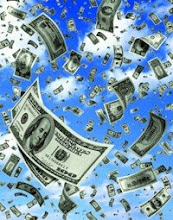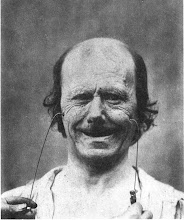My friend Randall (who hereinafter will be referred to as R. to protect his anonymity) called with a topic. When are we failures in life? His wife tells him he is a failure and he is past 60 with the kid grown and gone, so there is not much time to turn things around at this point.
R. disputes her conclusion. He sees his life as largely a success and his wife sees it as largely (or completely and totally) a failure. A loss. Not really worth having been lived.
I for one would be willing to declare R. a success on the basis of being a successful father alone. This was Jackie O's definition and she was rich and famous. So R. can accept this definition if he wants. His wife won't, but I'll give it to him. For that matter, it would be easy to make an argument for R. He was elected a member of his city counsel and had many successful law suits that mattered at least to his clients. Somehow, though, I don't think these would weigh much in the wifely judgment day.
I have further assured R. that in my experience, all husbands are sooner or later failures, completely and utterly. I further assured him that Kathy is always asking me, "If you're so smart, why aren't we rich." She throws out the decade that has passed without a vacation. She notes my car always looks like a wreck. My clothes are terrible. My dog is fat and has gas. She grumbles about the 32 inch waist I had when we were married that keeps swinging between 40 and 50 inches. Despite my soaring success in life (as I see it), she is sure I have failed and failed her as well. "I'm worried about my future," she cries.
And it is the same with all of our friends. I mentioned our mutual friends, all of whom are now about sixty and failures in the eyes of their wives. Some have actually saved money, have a nice house, annuities and 401 K plans, but their wives are still wrecks about the declining income and the likelihood of destitution. None of this seemed to comfort R.
Anyway, it is now incumbent upon me to redefine success and failure in such a way that R. and I and all of our friends (who have lived so long and have so little to show for it) are not failures.
Oddly, I don't remember much comment about the subject of failure from philosophers or novelists or poets in my decades of aimless and unproductive reading.
However, I do think when we read a translation of Aristotle and his definition of "happiness," this is something we would now call "success." My hope is that Aristotle can bail out R. and me and all others similarly situated. If we can claim to be a success by Aristotelian standards, this would largely negate being a failure when we are weighed in the wifely balance.
The word we translate as happiness is eudaimonia which breaks down, eu, "good" and daimonia, "spirit." By extension, it refers to good fortune or what we might usually call "success."
Happiness for moderns is subjective. You can take a pill or have whiskey and become happy. For Aristotle, a child could never be happy, because not enough life had been lived. Aristotle grappled with the concept of not calling anyone happy until his death and believed that the life of happiness could be negated even after death. If someone based his life on a project that was merely and illusion and false, this may not be learned until later. The happy life would be erased retroactively even if the dead was oblivious to the failure. If the dead man's son turns out to be a murderer, he will not have been happy.
Even for moderns, these things could be said about success. The apparently successful man might be safely in the grave when his children or his life's work goes on to prove he was a terrible failure.
First what I "remember" Aristotle said, but cannot find. Happiness (hereinafter called success) is achieved with good birth, good health, good land, good children and some other things like good horses.
These things are achieved by practicing the virtues. Political virtue is highly ranked. R. served as a counsel member for the poor area of town and worked to help them get the city services of the richer parts of town. Aristotle would give him high marks for this. I'd say a B or maybe an A-.
Aristotle would also judge success on how money is handled. He ranked liberality and magnificence high. Magnificence is something like giving a park to the city. I doubt R. was able to do much of this, but he always ranked high in liberality. He gave political contributions and attended the arts and bought lunches. Aristotle would probably at least give him a C+. Now this is the sticking point and where his wife probably fails him. In fact, a failure here for most wives seems to outweigh all the other grades. It is heavily weighted in the wifely report card.
Aristotle put a lot of stock in honor as well. I think he was talking about war or other sacrifice. R. probably wouldn't get much there.
Aristotle wanted a balance between ambitions and lack of ambition. R. may have fallen a little heavy in the lack of ambition category. OK, only a D, but it isn't failure.
On the anger/good temper grade, after overcoming a childhood inability to lose at ping pong, he would score very high on the good temper grade. Pushing an A, I would say.
Aristotle also graded success on friendliness, truthfulness and good-wit. R. really should get better than average on all of these. Especially on friendliness and good-wit. I don't know if Aristotle graded on a curve or not, but surely R. should get B's or better.
So, on Aristotle's success report card, I think R. would probably be a success.
How then, should he (and I and all others similarly situated) comfort ourselves on having failed on the wife report card? I say we look to true successes in life like Socrates, Tolstoy, Gandhi. If the biographers are correct, their wives would have given them failing grades as well.
Subscribe to:
Post Comments (Atom)


























_-_Dante_And_Virgil_In_Hell_(1850).jpg)























































5 comments:
I think Aristotle is correct
when he said you can't determine
whether you're happy
until you're dead.
therefore, you can only hope
to pursue the path to happiness
and say something like:
"I feel like I'm doing things that will make me happy."
i think then, your often cited source, the GDOB, said it best:
"The estimate and value of a man consist in the heart and the will: there his true honor lies." -- Essay I, 30.
if what you write of your friend R. is true,
then I would say he is a success.
I ponder this question more than is emotionally healthy. I think we need something tangible to feel accomplished. I remember one case against Child Protective Services wherein the psychiatrist (who was an hour late for the meeting) accused me of not knowing the facts of the case. As it turned out he was totally unaware CPS was accusing my client of allowing her son to be sexually molested. When he then agreed there was no evidence of same, we walked out of Buckners Children's home with her son. We all cried and I felt accomplished.
But then there was the 13 year old who molested the 2 year old - the facts made the claim impossible to believe - so the judge allowed me to walk out of the court with the 13 year old who upon leaving the court house said "a couple of days in jail was not to bad - so am I cleared?" Based on the mother's look we both knew at that moment he was guilty. It was not a good day.
So again, I say we seem to need something tangible to feel accomplished. A couple of great wins do not seem to do it when balanced against the wins which help promote bad behavior.
I would say to your wives - success comes when you can hug each other and say "thank you for the comfort of your being."
Since I have never brought this joy on another humanbeing, I guess I will never feel accomplished.
I am willing to bet your wives will be taken aback when you retort with such a touchy feeling response.
Bobby WC
“If you're so smart, why aren't we rich?"
I’ve seen this in your previous posts, and rather than ask Kathy what her definition of “rich” might be, I would like to ask her if she’s even vaguely aware of the difficult downside of being rich.
She may not know what it’s like being constantly hounded by charities, having to endure the vacant stares of begging orphans, having to ask the homeless guy on the street corner “what the hell did you do with that half eaten sandwich I gave you yesterday?”, having to let the maid off early because she claims her kid is sick, but all this can be very difficult.
What about the 39.5% income tax, the 15% capital gains tax, 17.3% withholding tax, 8% sales tax, 6% luxury tax, and 2% property tax to name just a few? These onerous tax burdens alone have caused me to delay delivery of the new Citation.
Hardly a day passes that I don’t have to kick some poor Widow out to the street for failure to pay her rent. I know the place may be disgusting but that’s what makes it such a hardship to re-rent in these difficult economic times. This is only a small example of the great burdens of being “smart enough to be rich.”
So Kathy, just be thankful that you are not very smart.
Poor Misunderstood Rich Guy
A lawyers lament no doubt. A hospice worker wouldn't even have an inkling of thought on the subject and the recipient of the care, would care less.
V. Hugo 2006
E,
Perpetual restlessness is a sign you are bored, not unhappy.
Maybe its the blog. Better than the alternative as I am still deciphering the Quentin C. reference.
Kurgan
Post a Comment